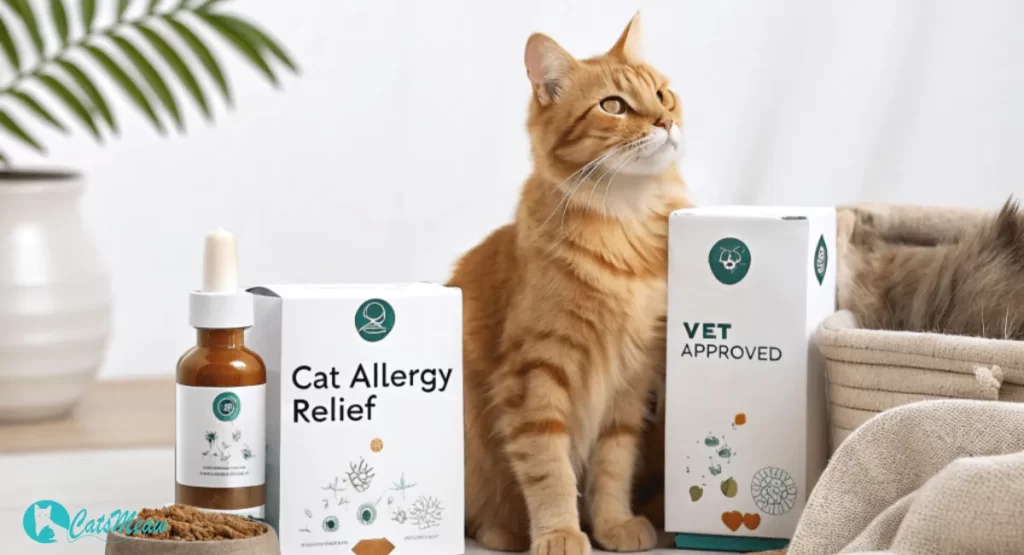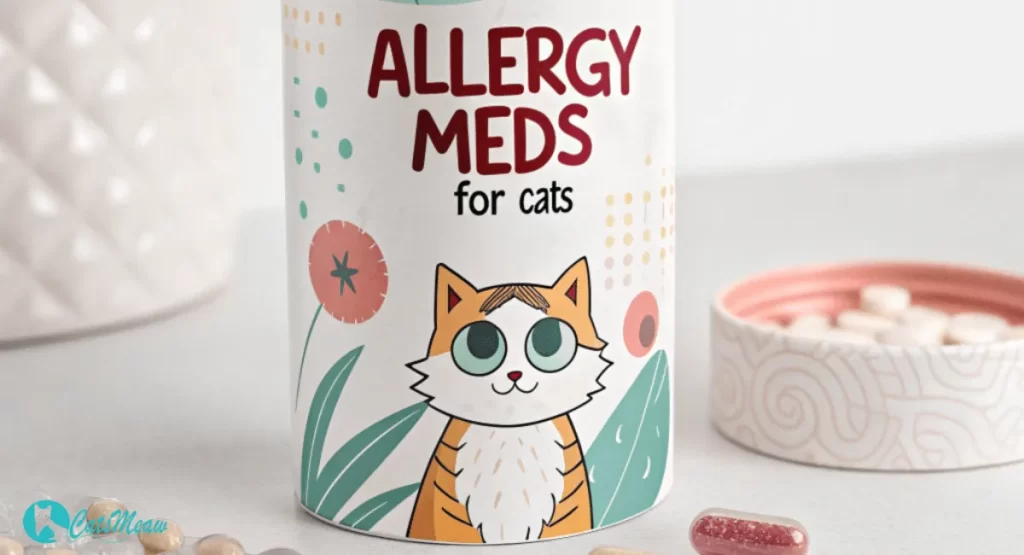Living with a cat allergy doesn’t mean you have to part with your furry companion. Thanks to advancements in medicine and thoughtful preventative measures, it’s possible to effectively manage symptoms and share a harmonious home with your feline friend. This guide will delve into the causes of cat allergies, treatment options, prevention strategies, and answers to common questions about cat allergy meds.

Understanding Cat Allergies
Cat allergies are caused by proteins found in a cat’s saliva, urine, and skin cells, with Fel d 1 being the most common allergen. These proteins spread into the environment when a cat grooms itself, landing on its fur and becoming airborne. Over time, these microscopic particles settle on surfaces, bedding, and clothing, triggering allergic reactions in sensitive individuals.
Studies show that even short-haired or hairless breeds can produce these allergens, dispelling the myth that specific breeds are allergy-free. Reducing exposure and managing symptoms effectively requires a combination of appropriate allergy meds for cats and environmental changes.
Common Symptoms of Cat Allergies
Cat allergy symptoms vary in intensity and may include:
- Respiratory Symptoms: Sneezing, nasal congestion, runny nose, and coughing.
- Ocular Symptoms: Watery, itchy, or red eyes.
- Skin Symptoms: Rashes, hives, or eczema flare-ups after direct contact.
- Severe Reactions: Asthma-like symptoms such as wheezing, chest tightness, or difficulty breathing.
Early recognition of these symptoms is essential for seeking the right treatment. Read Allergies in Cats: Causes, Symptoms & Treatments for more insight into recognizing and addressing feline-related allergens.
Best Allergy Meds for Cats
Effective management of cat allergies often requires using medications tailored to the individual’s needs. Let’s explore the most commonly used options:
Antihistamines
Antihistamines are a go-to treatment for mild to moderate allergies. Medications like cetirizine (Zyrtec) and loratadine (Claritin) work by blocking histamine, a chemical responsible for allergy symptoms. These over-the-counter options relieve sneezing, itching, and watery eyes. For cats experiencing allergies, consult your veterinarian about appropriate dosages and use.
Corticosteroids
Corticosteroids are potent anti-inflammatory medications prescribed for severe allergic reactions. Fluticasone (Flonase) and prednisone are commonly recommended for humans, while veterinarians may prescribe feline-specific corticosteroids for cats with allergies.
Immunotherapy (Allergy Shots)
Immunotherapy offers a long-term solution for allergy sufferers. This treatment gradually exposes the immune system to small allergens, desensitizing the body over time. While effective, it requires a significant time commitment and regular visits to an allergist or veterinarian.
For more detailed information about allergy medications, visit Benadryl for Cats: Uses, Dosage, and Tips.
Environmental Strategies to Reduce Allergens
While medication can address symptoms, controlling the environment is key to minimizing allergen exposure. Here’s how you can make your home more allergy-friendly:
1- Regular Cleaning Routines
Frequent cleaning reduces allergen buildup. Use a vacuum with a HEPA filter to capture airborne particles and wash your cat’s bedding weekly. Cleaning furniture, curtains, and other surfaces can further reduce allergen presence.
2- Use of Air Purifiers
High-efficiency particulate air (HEPA) purifiers are excellent for trapping allergens circulating in the air. For maximum effectiveness, place purifiers in high-traffic areas like living rooms and bedrooms.
3- Limit Cat Access to Certain Areas
Designate allergy-free zones, such as bedrooms, to reduce exposure in spaces where you spend the most time. Use baby gates or closed doors to limit your cat’s movement throughout the house.
Natural Remedies for Cat Allergies
For those seeking holistic approaches, natural remedies can complement traditional treatments:
- Grooming Your Cat Regularly: Frequent brushing and bathing can reduce dander. Use a hypoallergenic shampoo to neutralize allergens on your cat’s coat.
- Dietary Adjustments: Adding omega-3 fatty acids to your cat’s diet promotes skin health, reducing dander production.
- Allergen-Neutralizing Sprays: These sprays can be applied to furniture and fabrics, reducing the presence of allergenic proteins.
Discover more tips in Best Natural Remedies for Cat Allergies.

Comparing Over-the-Counter and Prescription Treatments
Choosing between over-the-counter (OTC) and prescription treatments depends on the severity of symptoms and individual needs.
- OTC Medications are ideal for mild symptoms. Options like Zyrtec, Claritin, and Flonase are readily available and provide quick relief.
- Prescription Treatments: These are necessary for severe or chronic allergies. A healthcare provider may prescribe corticosteroids or immunotherapy.
Before starting any treatment, consult a veterinarian or allergist to determine the best action.
The Role of Your Veterinarian
Veterinarians are instrumental in managing cat allergies, particularly when your cat is the source of the allergens. They can:
- Recommend safe medications for your cat’s allergies.
- Prescribe corticosteroids or antihistamines for your cat if needed.
- Provide advice on reducing allergen spread in your home.
For expert guidance, read Common Cat Diseases: Symptoms & Prevention.
Can Cat Allergies Be Cured?
Currently, there is no permanent cure for cat allergies. However, emerging research on Fel d 1-neutralizing therapies shows promise. Experimental treatments aim to target the source of allergens directly, offering hope for long-term relief. Stay updated with advances in this field by visiting NIH Research: Experimental Cat Allergy Shots.
Living Comfortably with Cats Despite Allergies
Adopting a multi-faceted approach ensures you can coexist with your feline friend without constant discomfort. Combining medication, environmental modifications, and regular vet check-ups helps alleviate allergy symptoms while maintaining your bond with your pet.
Check out Best Practices to Get Rid of Cat Fleas for practical tips on improving your cat’s environment.
FAQs: Allergy Meds for Cats
1- What allergy meds are safe for cats?
Antihistamines like diphenhydramine (Benadryl) and cetirizine (Zyrtec) are considered safe for cats when used correctly. Always consult a veterinarian for proper dosage and usage instructions.
2- Is Benadryl or Zyrtec better for cat allergies?
Zyrtec is less sedating than Benadryl, making it a preferred choice for long-term use. Benadryl works well for acute symptoms but may cause drowsiness in humans and pets.
3- How much Zyrtec do I give my cat?
The standard dosage for cats is typically 5 mg once daily. However, Zyrtec dosage may vary depending on your cat’s weight and health, so consult your vet before administering.
4- What is the best natural treatment for cat allergies?
Natural treatments include regular grooming, feeding omega-3 supplements, and using allergen-neutralizing sprays. These methods work best alongside other preventative measures.
Conclusion
Managing cat allergies requires a combination of medication, environmental adjustments, and expert advice. From over-the-counter solutions to natural remedies, numerous ways exist to improve your quality of life while keeping your feline companion close. For more insights into feline health and wellness, explore CatsMeaw.
